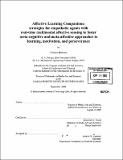Affective learning companions : strategies for empathetic agents with real-time multimodal affective sensing to foster meta-cognitive and meta-affective approaches to learning, motivation, and perseverance
Author(s)
Burleson, Winslow
DownloadFull printable version (25.36Mb)
Other Contributors
Massachusetts Institute of Technology. Dept. of Architecture. Program In Media Arts and Sciences
Advisor
Rosalind W. Picard.
Terms of use
Metadata
Show full item recordAbstract
This thesis has developed an affective agent research platform that advances the architecture of relational agents and intelligent tutoring systems. The system realizes non-invasive multimodal real-time sensing of elements of user's affective state and couples this ability with an agent capable of supporting learners by engaging in real-time responsive expressivity. The agent mirrors several non-verbal behaviors believed to influence persuasion, liking, and social rapport, and responds to frustration with empathetic or task-support dialogue. Pilot studies involved 60 participants, ages 10-14 years-old, and led to an experiment involving 76 participants, ages 11-13 years-old, engaging in the Towers of Hanoi activity. The system (data collection, architecture, character interaction, and activity presentation) was iteratively tested and refined, and two "mirroring" conditions were developed: "sensor driven non-verbal interactions" and "pre-recorded non-verbal interactions". The development and training of the classifier algorithms showed the ability to predict frustration/help seeking behavior with 79% accuracy across a pilot group of 24 participants. (cont.) Informed by the theory of optimal experience (Flow) and a parallel theory of a state of non-optimal experience (Stuck), developed in this thesis, the effects of "affective support" and "task support" interventions, through agent dialogue and non-verbal interactions, were evaluated relative to their appropriateness for the learner's affective state. Outcomes were assessed with respect to measures of agent emotional intelligence, social bond, and persuasion, and with respect to learner frustration, perseverance, metacognitive and meta-affective ability, beliefs of one's ability to increase one's own intelligence, and goal-mastery-orientation. A new simple measure of departure dialogue was shown to have a significant relationship with the more lengthy and explicit social bond Working Alliance Inventory survey instrument; its validity was further supported through its use in assessing the social bond relationship with other measures. Over-estimation of the duration of the activity was associated with increased frustration. Gender differences were obtained with girls showing stronger outcomes when presented with affect-support interventions and boys with task-support interventions. Coordinating the character's mirroring with intervention type and learners' frustration was shown to be important.
Description
Thesis (Ph. D.)--Massachusetts Institute of Technology, School of Architecture and Planning, Program in Media Arts and Sciences, 2006. Includes bibliographical references (leaves 93-98).
Date issued
2006Department
Program in Media Arts and Sciences (Massachusetts Institute of Technology)Publisher
Massachusetts Institute of Technology
Keywords
Architecture. Program In Media Arts and Sciences